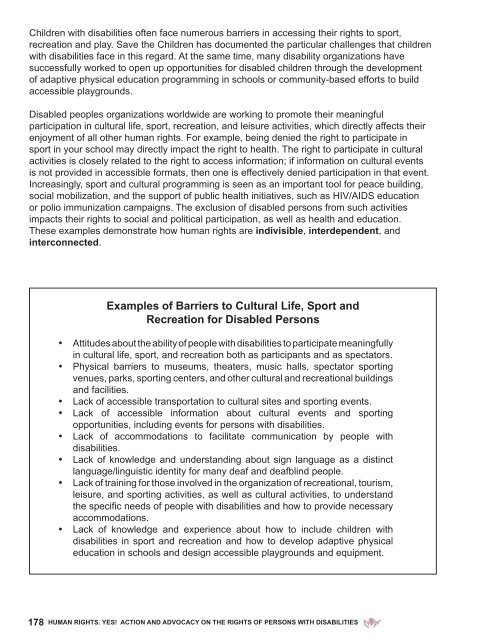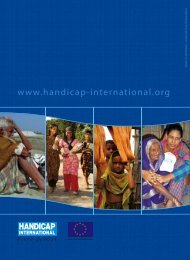Full page photo print - Harvard Law School Project on Disability
Full page photo print - Harvard Law School Project on Disability
Full page photo print - Harvard Law School Project on Disability
You also want an ePaper? Increase the reach of your titles
YUMPU automatically turns print PDFs into web optimized ePapers that Google loves.
Children with disabilities often face numerous barriers in accessing their rights to sport,<br />
recreati<strong>on</strong> and play. Save the Children has documented the particular challenges that children<br />
with disabilities face in this regard. At the same time, many disability organizati<strong>on</strong>s have<br />
successfully worked to open up opportunities for disabled children through the development<br />
of adaptive physical educati<strong>on</strong> programming in schools or community-based efforts to build<br />
accessible playgrounds.<br />
Disabled peoples organizati<strong>on</strong>s worldwide are working to promote their meaningful<br />
participati<strong>on</strong> in cultural life, sport, recreati<strong>on</strong>, and leisure activities, which directly affects their<br />
enjoyment of all other human rights. For example, being denied the right to participate in<br />
sport in your school may directly impact the right to health. The right to participate in cultural<br />
activities is closely related to the right to access informati<strong>on</strong>; if informati<strong>on</strong> <strong>on</strong> cultural events<br />
is not provided in accessible formats, then <strong>on</strong>e is effectively denied participati<strong>on</strong> in that event.<br />
Increasingly, sport and cultural programming is seen as an important tool for peace building,<br />
social mobilizati<strong>on</strong>, and the support of public health initiatives, such as HIV/AIDS educati<strong>on</strong><br />
or polio immunizati<strong>on</strong> campaigns. The exclusi<strong>on</strong> of disabled pers<strong>on</strong>s from such activities<br />
impacts their rights to social and political participati<strong>on</strong>, as well as health and educati<strong>on</strong>.<br />
These examples dem<strong>on</strong>strate how human rights are indivisible, interdependent, and<br />
interc<strong>on</strong>nected.<br />
examples of barriers to cultural life, sport and<br />
Recreati<strong>on</strong> for disabled Pers<strong>on</strong>s<br />
• Attitudes about the ability of people with disabilities to participate meaningfully<br />
in cultural life, sport, and recreati<strong>on</strong> both as participants and as spectators.<br />
• Physical barriers to museums, theaters, music halls, spectator sporting<br />
venues, parks, sporting centers, and other cultural and recreati<strong>on</strong>al buildings<br />
and facilities.<br />
• Lack of accessible transportati<strong>on</strong> to cultural sites and sporting events.<br />
• Lack of accessible informati<strong>on</strong> about cultural events and sporting<br />
opportunities, including events for pers<strong>on</strong>s with disabilities.<br />
• Lack of accommodati<strong>on</strong>s to facilitate communicati<strong>on</strong> by people with<br />
disabilities.<br />
• Lack of knowledge and understanding about sign language as a distinct<br />
language/linguistic identity for many deaf and deafblind people.<br />
• Lack of training for those involved in the organizati<strong>on</strong> of recreati<strong>on</strong>al, tourism,<br />
leisure, and sporting activities, as well as cultural activities, to understand<br />
the specific needs of people with disabilities and how to provide necessary<br />
accommodati<strong>on</strong>s.<br />
• Lack of knowledge and experience about how to include children with<br />
disabilities in sport and recreati<strong>on</strong> and how to develop adaptive physical<br />
educati<strong>on</strong> in schools and design accessible playgrounds and equipment.<br />
178 hUmAn RighTs. yes! AcTi<strong>on</strong> And AdvocAcy <strong>on</strong> The RighTs of PeRs<strong>on</strong>s wiTh disAbiliTies




